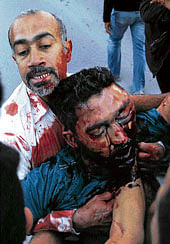Bahrain protests turn into uprising

But by Thursday, masses of protesters were chanting slogans like “death to Khalifa,” referring to King Hamad bin Isa al-Khalifa, while the opposition withdrew from Parliament and demanded that the government step down.
The protests here, while trying to mimic those in Egypt and Tunisia, add a dangerous new element: religious divisions. The king and the ruling elite of Bahrain are Sunni, while the majority of the population are Shiites, who have been leading the demonstrations and demanding not only more freedom but equality.
The king is distrustful enough of his Shiite subjects that many of his soldiers and police are foreigners hired by the government.
On Friday, in the village of Sitra, south of Manama, a crowd of thousands accompanied the coffins of Ali Mansour Ahmed Khudair, 53, and Mahmoud Makki Abutaki, 22, both killed by shotgun fire on Thursday.
The coffins were carried on the roofs of two cars as a man with a loudspeaker led the crowd in its chants from the bed of a pickup truck, alternating between calls to the faithful—“There is no God but God”—with political messages such as “We need constitutional reform for freedom.”
In the sun-scorched, sandy cemetery with its crumbling white headstones, the bodies were laid to rest on their sides so that they faced the Muslim holy city of Mecca in Saudi Arabia. “Have you seen what they have done to us,” said Aayat Mandeel, 29, a computer technician. “Killing people for what? To keep their positions?” After the burials, the crowds moved off to a major mosque for noon prayers on the Muslim holy day, an occasion that has provided a focus for protests elsewhere in the region. But it was not clear whether religious leaders would urge them to continue their demonstrations.
In shock
For those who were in the traffic circle known as Pearl Square on Thursday when the police opened fire without warning on thousands who were sleeping there, it was a day of shock and disbelief. Many of the hundreds taken to the hospital were wounded by shotgun blasts, doctors said, their bodies speckled with pellets or bruised by rubber bullets or police clubs.
In the morning, there were three bodies already stretched out on metal tables in the morgue at Salmaniya Medical Complex: Khudair, dead, with 91 pellets pulled from his chest and side; Isa Abd Hassan, 55, dead, his head split in half; Abutaki, dead, with 200 pellets of birdshot pulled from his chest and arms.
Doctors said that at least two others had died and that several patients were in critical condition with serious wounds. Muhammad al-Maskati, of the Bahrain Youth Society for Human Rights, said he had received at least 20 calls from frantic parents searching for young children.
A surgeon said that for hours on Thursday the Health Ministry prevented ambulances even from going to the scene to aid victims. The doctor said that in the early morning, when the assault was still under way, police officers beat a paramedic and a doctor and refused to allow medical staff to attend to the wounded.
There was collective anxiety as Friday approached and people waited to see whether the opposition would challenge the government’s edict to stay off the streets. The government had made it clear that it would not tolerate more dissent, saying it would use “every strict measure and deterrent necessary to preserve security and general order.” Both sides said they would not back down.
“You will find members of Al Wefaq willing to be killed, as our people have been killed,” said Khalil Ebrahim al-Marzooq, one of 18 opposition party members to announce Thursday that they had resigned their seats. “We will stand behind the people until the complete fulfillment of our demands.”